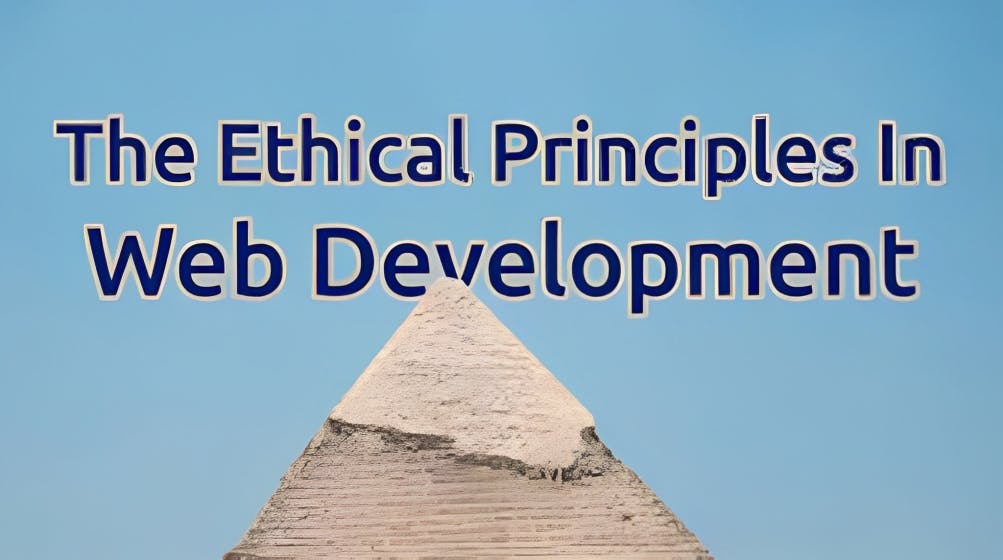The Ethical Impacts of Web Development: What You Need to Know
How we perceive today's fast-paced online environment depends heavily on web design. From social media networks to e-commerce platforms, web development is the building block of the internet. But with tremendous power comes great responsibility, thus it's imperative to talk about how ethical web development practices are. This in-depth post will examine the main issues that need our attention as we dig into the ethical implications of web development.
Data Privacy and Security Concerns
Data security and privacy are now crucial in our connected society. Web developers collect a tonne of user data when they build websites and services. This data might include private information like names and addresses as well as sensitive information like financial data and surfing patterns. Securing this data must be a top priority for ethical developers, who must also use strong encryption techniques and keep up with the most recent security standards. A breach of user data can have severe consequences, including identity theft and financial fraud, making data protection a moral imperative.
Accessibility for All
Web design ought to serve a wide range of users, including those with impairments. Designing and developing websites in a way that assures persons with visual, aural, cognitive, or movement disabilities can access and engage with the material efficiently is known as the web accessibility principle. To promote inclusiveness and equitable access to information and services, ethical web development entails abiding by accessibility standards like the Web Content Accessibility Guidelines (WCAG).

Environmental Impact
The digital world consumes vast amounts of energy, and web development contributes to this energy footprint. As websites and applications grow in complexity, they demand more server power and data storage, leading to increased energy consumption. Ethical web development calls for adopting sustainable practices, such as using renewable energy sources for hosting, optimizing code to reduce page load times, and promoting minimalistic designs. By embracing eco-friendly approaches, developers can mitigate their environmental impact and contribute positively to the planet.
E-Waste Management
In the fast-paced tech industry, new devices and technologies emerge rapidly, leading to electronic waste (e-waste) accumulation. Web development indirectly contributes to e-waste as users frequently upgrade their devices to access the latest applications and websites. Ethical developers must consider the lifecycle of their creations and design platforms that are backward compatible and resource-efficient. Additionally, promoting responsible e-waste disposal and recycling can help minimize the environmental consequences of digital advancements.
Net Neutrality and Fair Access
Net neutrality is a crucial ethical aspect of web development. It promotes treating all internet traffic fairly, regardless of where it comes from, where it is going, or what is on it. Net neutrality is a cause that ethical developers should support, making sure that nothing they create favors one website or service over another. By maintaining an open and neutral internet, web developers can uphold fairness and equal access to information, fostering a democratic online environment.
Transparency and Informed Consent
Web developers often integrate third-party services, such as analytics tools and ad networks, into their platforms. Ethical practices dictate the need for transparency about data collection and usage. Users need to be made aware of the information being collected, how it will be put to use, and who it could be shared with. Obtaining informed consent from users empowers them to make conscious decisions about their online presence and enhances trust between developers and their audiences.
Social Impact and Responsibility
Web development can significantly impact society and culture. Developers have a responsibility to consider the potential consequences of their creations. For instance, social media platforms can influence public opinions and behavior, making ethical design and content moderation critical. By encouraging positive interactions and combating misinformation, developers can contribute to a healthier digital ecosystem.
Conclusion
In conclusion, the ethical impacts of web development go beyond writing code and designing interfaces. Data privacy, accessibility, environmental sustainability, and justice must all be prioritized as part of an all-encompassing strategy for ethical online development. The development community can establish a digital environment that promotes trust and improves the lives of users by embracing openness, inclusion, and accountability. Web designers must be conscious of the ethical ramifications of their work as the internet develops and try to create a better, more moral online environment for everyone.
For more information, click on: https://www.infydots.com/ethical-impacts-of-web-development-need-to-know/